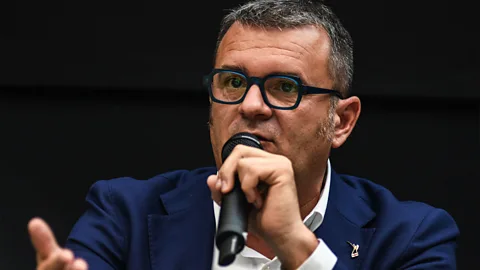Eurovision 2025: The provocative Estonian pop song that has caused outrage in Italy
 Alina Pyazok
Alina PyazokOne of the most controversial entries in the Eurovision song contest is Espresso Macchiato by Estonia's Tommy Cash. It mocks Italian stereotypes, and there have been calls to ban it.
The track by Estonian rapper and singer Tommy Cash is the country's entry into the 2025 Eurovision Song Contest, which takes place next week. When its inclusion in the competition was announced, some reacted with bemusement, and others with outrage, especially in Italy, due to the way Cash seems to mock the country with his faux-operatic, broken Italian accent and deployment of Italian stereotypes. "I love anything trashy," Cash tells the BBC, giggling, explaining the simple thinking behind the track, which some Italians have even called on to be banned from the competition.
Espresso Macchiato is hardly the first song to send up Italian stereotypes: see the Italian-American novelty songs of the war and post-war period like Mambo Italiano and many others. And self-parody is part and parcel of Eurovision, particularly among Eastern European acts – see for example Poland's 2014 entry My Slowianie, which parodied the country's gender stereotypes, or Greece's satirical 2013 song Alcohol is Free, which dealt with the Greek financial crisis. However Cash's Eurovision entry may be the first to parody another competing nation. It's a bold choice for Eurovision, an event that has functioned as much more than a mere singing competition since its inception.
Disrupting Eurovision values
Today, Eurovision sees more than 35 countries, mainly from Europe, participate while it holds the distinction of being one of the world's longest-running annual television broadcasts, drawing a huge global audience of hundreds of millions. It fosters interconnection among European nations, becoming fodder for small talk and providing a sense of shared purpose and mythos across the continent. And while its rules explicitly forbid "lyrics, speeches, gestures of a political or similar nature", Eurovision has served a political purpose. Since the inaugural contest in 1956, when it was set up by Marcel Bezençon, the director of the European Broadcasting Union (EBU), to help unify a fractured post-war Europe, Eurovision has served as a stage for "cultural exchange, diplomacy, and national branding", according to one study.
"The purpose of Eurovision is to unite Europe," says musicologist Anna G Piotrowska. "It's educational, too, a way [for audiences] to learn about a country's traditions and how its people express themselves today." In that way, we might liken Eurovision to a very mild display of national propaganda, with songs often designed to showcase their country's cultural values and appeal. Fittingly, media scholar Göran Bolin argued that the Eurovision Song Contest is the musical equivalent of a world's fair, a large-scale international exhibition that brings together countries from around the globe to showcase their cultures and achievements.
For Estonia, Eurovision carries particularly weighty significance. The country has only won the competition once, for their 2001 entry Everybody. One commentator described that win as the single most important event in Estonia's history since it secured independence from the Soviet Union 10 years earlier. Indeed, the victory was seen as a crowning moment for the country's successful reintegration back into Europe as it sought a clean break from its communist past. Now, with Estonia currently trying to phase out school pupils being taught in the Russian language, it is seeking to re-establish its cultural independence. It is odd, then, that it has plumped for a song this year that has nothing to do with its own culture. What's more, Cash's entry appears to satirise the very notion of national representation upon which Eurovision rests.
Given that the competition is such a useful tool for cultural diplomacy, why, then, is Cash entering with a song solely devoted to mocking Italian stereotypes? "Because it's funny," he says, which is one of his common catchphrases. Cash treats whatever tickles him with grave seriousness, crafting his comedy with great meticulousness. But his pranksterish attitude has rankled certain Italians, as well as of Eurovision's year-round international fanbase.
 Alamy
AlamyWhile filming recently in Brazil, one Eurovision fan gave Cash a piece of her mind, he recalls. "She told me that half of the fanbase loved me and the other half couldn't stomach me, because they feel I'm mocking Eurovision and just treating it as some big joke," he says. "That's just not entirely true. If this were all some big joke for me, I wouldn't be putting all this work into it. I'd just stand at the back of the stage, drink coffee, and wait for the lights to come back on." In fact, Cash says he's treating Eurovision like a "boxing camp". Speaking to him two months out from the competition, he says he's already rehearsing five full days a week.
A history of provocation
Cash's taste for parodying other cultures is not limited to Italy. Last year, he released Untz Untz, a song whose title is derived from the stereotypical sound of a dance beat, which was a clear spoof of German techno culture. Indeed, Untz Untz, he says, was the catalyst for setting his Eurovision journey in motion. He received astonishing national for it, with the official Estonian Olympic team posting his extremely risqué video on their social media. It became a building block for Cash's Eurovision journey, suggesting to him that he would have the necessary national backing to enter, as was proven, when he won Estonia's Eurovision pre-selection contest Eesti Laul in February. "It also proved to me that this is the year when I do stuff that I haven't done before," he says. "My career is pretty colourful, and I've done so many interesting projects. You know, why not have Eurovision on my Wikipedia page and put my name in the history books of my country">window._taboola = window._taboola || []; _taboola.push({ mode: 'alternating-thumbnails-a', container: 'taboola-below-article', placement: 'Below Article', target_type: 'mix' });
